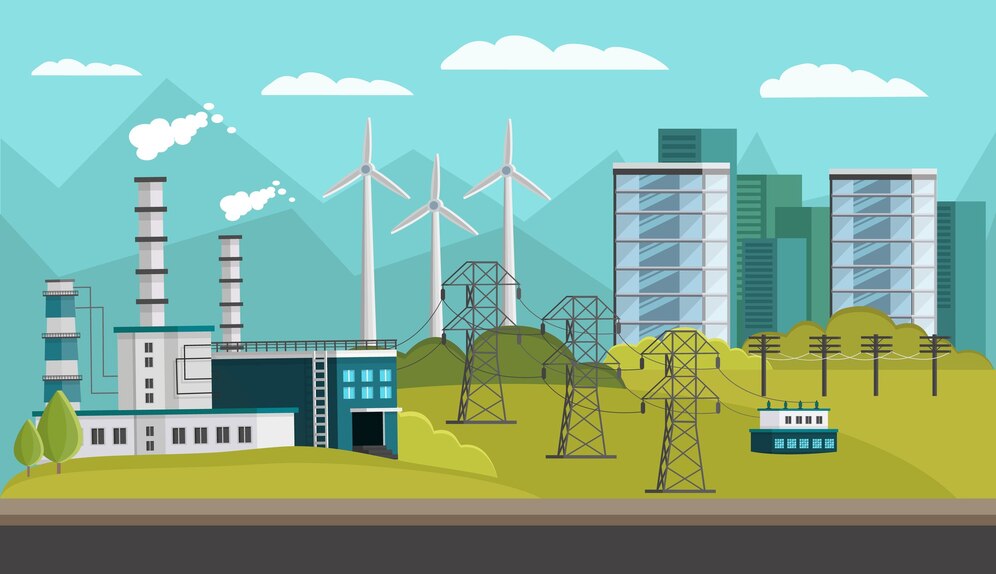Power stations, often overlooked in discussions of economic development, are the unsung heroes behind the growth and prosperity of nations.
These colossal structures, whether fueled by coal, natural gas, nuclear energy, or renewable sources, serve as the backbone of energy infrastructure, providing the electricity necessary to fuel industries, power homes, and drive economic progress.
In this article, we delve into the vital role that power stations play in driving economic development and shaping the future of nations.
Powering Industries
At the heart of every thriving economy lies a robust industrial sector, and power stations are instrumental in its success. Industries such as manufacturing, mining.
And agriculture relies heavily on a consistent and affordable supply of electricity to power machinery, equipment, and processes.
Without reliable energy sources provided by power stations, these industries would grind to a halt, stifling productivity, innovation, and economic growth.
Empowering Businesses
In addition to supporting large-scale industries, power stations also play a crucial role in empowering small and medium-sized enterprises (SMEs) and fostering entrepreneurship.
Businesses of all sizes rely on electricity to operate essential equipment, run day-to-day operations, and serve customers.
Whether it’s a corner bakery, a tech startup, or a neighborhood grocery store, access to reliable electricity from power stations is essential for business continuity and growth.
Fueling Urbanization
As populations continue to migrate from rural areas to urban centers in search of better opportunities, power stations play a critical role in supporting urbanization and meeting the growing energy demands of cities.
Urban areas are hubs of economic activity, innovation, and cultural exchange, but they also consume vast amounts of electricity for lighting, transportation, heating, and cooling.
Power stations
Power stations provide the energy infrastructure necessary to power skyscrapers, apartment complexes, transportation networks, and public amenities that define modern cities.
They enable the development of smart cities, where digital technologies and connectivity enhance efficiency, sustainability, and quality of life.
By fueling urbanization, power stations drive economic growth, attract investment, and create vibrant urban ecosystems that drive progress.
Pioneering Renewable Energy
In recent years, there has been a growing recognition of the need to transition to more sustainable and environmentally friendly energy sources.
Power stations have responded to this challenge by embracing renewable energy technologies such as solar, wind, hydroelectric, and geothermal power.
These renewable energy sources offer numerous economic benefits, including job creation, energy independence, and reduced environmental impact.
Infrastructure Investment
Power stations are often the focus of significant infrastructure investment, both in terms of initial construction and ongoing maintenance and upgrades.
This investment not only creates jobs and stimulates economic activity in the short term but also enhances the reliability and efficiency of the energy infrastructure, supporting long-term economic growth and competitiveness.
Attracting Industry and Investment
Access to reliable and affordable electricity provided by power stations is a key factor in attracting industry and investment to a region.
Businesses seeking to establish operations look for locations with stable energy supplies, and regions with well-developed power infrastructure are more likely to attract investment, spur economic development, and create jobs.
Supporting Agriculture and Rural Development
Power stations play a vital role in supporting agriculture and rural development by providing electricity for irrigation, processing, storage, and transportation.
Access to reliable electricity enhances agricultural productivity, expands market access, and improves living standards in rural communities, contributing to poverty reduction and sustainable development.
Enabling Innovation and Entrepreneurship
Power stations provide the energy infrastructure necessary to support innovation and entrepreneurship across various sectors.
They power research laboratories, technology incubators, and startup ecosystems, enabling entrepreneurs to develop new products, services, and business models that drive economic growth and competitiveness.
Promoting Trade and Globalization
Power stations facilitate international trade and globalization by powering ports, airports, logistics hubs, and manufacturing facilities involved in global supply chains.
Access to reliable electricity enables efficient transportation, logistics, and production processes, reducing costs and increasing competitiveness in the global marketplace.
Addressing Energy Poverty
In regions where access to electricity is limited or unreliable, the expansion of power stations can have a transformative impact on economic development and poverty reduction.
By providing reliable electricity to underserved communities, power stations improve access to education, healthcare, communication, and economic opportunities, empowering individuals and communities to improve their livelihoods and quality of life.
Resilience and Disaster Recovery
Power stations play a critical role in enhancing resilience and disaster recovery efforts by providing reliable backup power during emergencies and natural disasters.
They enable essential services such as hospitals, emergency response centers, and communication networks to continue operating during power outages, minimizing the impact of disasters on public safety and economic stability.
Environmental Considerations
While power stations are essential for economic development, it’s crucial to balance their role with environmental sustainability.
The transition to cleaner and more efficient power generation technologies, such as renewable energy and carbon capture and storage, can mitigate the environmental impact of power stations while supporting economic growth and development.
Conclusion
In conclusion, power stations are not merely structures of steel and concrete; they are engines of economic development, driving progress, prosperity, and opportunity for nations around the world.
From powering industries and empowering businesses to fueling urbanization and pioneering renewable energy, power stations play a multifaceted role in shaping the economic landscape of nations.



